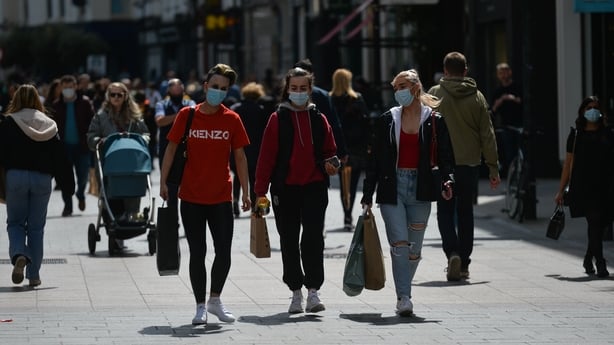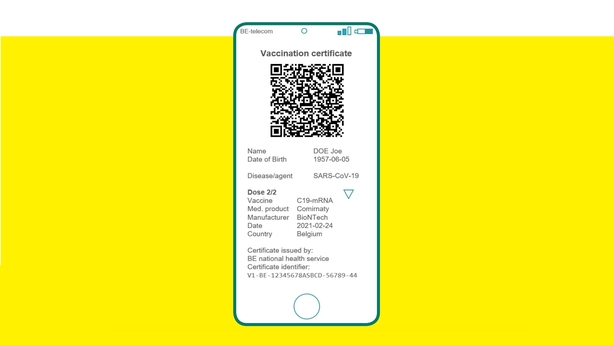If you squint, and put on an extra layer, it could almost have been Rome. On Thursday, customers of Italian restaurant Carluccios on Dublin's Dawson Street were enjoying their takeaway coffees and pastries in the sunshine.
There was a buzz in town, and life has undoubtedly returned to the city’s streets.
While the Government is set to consider easing international travel restrictions from 19 July, it will be the EU Digital Covid Certificate that will be key to allowing us to enjoy similar scenes on foreign shores.
From the beginning of July, EU countries have six weeks to implement the certificate.
The Minister of State for eGovernment, Ossian Smyth, has said Ireland hopes to roll out the system within a week of the EU launch.
But it remains to be seen if the minister's determination will be enough to navigate the additional challenges presented by the HSE's cyber attack.
The chief executive of the Daa, the operator of Dublin and Cork airports, told Prime Time that the "huge pressure" the Department of Health was facing following the attack could delay the certificate's implementation.
Once it does get up and running, it will show if you've been vaccinated, tested negative, or recovered from Covid-19. A QR code will either be printed or shown on screen alongside a digital signature verified by European authorities.

Given the projected time to fully vaccinate the adult population, it’s fair to say that there will be a significant number of people looking to travel on the basis of a negative PCR or antigen test.
The Department of Health said the Government "is giving close consideration to the current international travel policy, including any supporting role the [digital] certificate may play".
Senior sources in the Government suggest that the current thinking is that PCR status will be treated on a par with vaccination.
Relaxing on steps near Carluccios were two would-be holiday makers who have trained their eyes on a PCR-linked holiday. The women in their 20s spoke to Prime Time socially distanced, while sipping on a smoothie and dreaming of trips to come.
"Definitely Italy," one of the women said. "I just want to go for the pasta and wine."
Sorry Carluccios, but the real thing is still much coveted.
"By the time I get the vaccine, it will probably be the end of the year, so at least I’ll have the option of getting a test to go away," the second woman added.
"There needs to be an option for people like us who are too young. So we’re not left here and everyone that’s vaccinated can go off on their holidays."
But despite the hopes of holiday makers, some are warning that, if the PCR test is treated on a par with vaccination, Ireland could be opening itself up to the importation of variants.
"I think by rushing and by taking maybe a few steps too far and and having uncontrolled or unrestricted international travel would be, I think, a step too far," Prof Aoife McLysaght of the Independent Scientific Advocacy Group told Prime Time.
"If we're talking about just a PCR test the day before travel, that doesn't tell us enough that we can be confident that we're protecting ourselves against potential problems."
Prof McLysaght argued that permitting travel without significant restrictions would leave the country open to the importation of the Indian variant.
"The B1617.2 [Indian] variant is rising in frequency in the UK. We have to be really careful about letting that variant in until we know more," she said.

But aside from the public health worries over allowing those with negative PCR tests to travel, there are also concerns from private test providers here.
HSE tests for Covid-19 are only available for close contacts and those who are symptomatic.
If you want a test to go on holidays, you’ll need to go to a private provider and they are warning that there is currently no way for the results to be fed into the digital green certificate system.
"No provider system at the moment has been integrated into the system that I'm aware of," Dave Rock, Director of the RocDoc testing service told Prime Time.
RocDoc, which operates PCR testing at all of the main Irish airports, is ramping up capacity to undertake 10,000 tests a day in anticipation of a return to travel. But it is waiting to hear how its system will be incorporated into the certificate system.
"We have reached out and we have teams on standby ready to do this integration piece," said Mr Rock.
"From our IT and development point of view, all our systems are ready to go.
"We understand there are GDPR and security concerns but we're hoping that the powers that be can make this happen."






